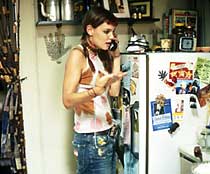Each year in Park City, Utah, hundreds
of new filmmakers vie with established independent directors
to make a name for themselves at Sundance, the most well-known
of American film festivals.
Since Brooklyn has a thriving arts community, it’s not surprising
that there was a strong borough presence at this year’s festival,
which took place from Jan. 16-26.
At Sundance, there is the all-important competition for dramatic
features, documentaries and short films, where a win could mean
an even longer life for a film, as well as drumming up interest
that may not have been there before. But there are other sections
of the festival, and the smart festival-goer will look in many
of these areas to make their own film discoveries.
Heights resident Peter Hedges, whose screenplays include "What’s
Eating Gilbert Grape," "A Map of the World" and
"About a Boy," made his directorial debut with "Pieces
of April." Hedges also wrote this charming, funny, and bittersweet
film about one family’s attempt at a "normal" Thanksgiving,
thrown by the black sheep of the clan.
People started talking about Hedges’ film after its first screening
("buzz," as they like to call it in movie-land), and
distributors started negotiating. In just a few days, "Pieces
of April" was picked up by United Artists, guaranteeing
it a theatrical release.
Some filmmakers use Brooklyn locations for local color (Yon Motskin’s
"The Cutman," a short film about one man’s fading career
in the boxing biz, contains many Bed-Stuy scenes), others use
certain locations because that’s where the story is.
"Why Can’t We Be a Family Again," is Roger Weisberg
and Murray Nossel’s short documentary about two young boys struggling
with their mother’s addictions while living with their grandmother
in Sunset Park.
Brooklyn-based composer David Reid, who created the music for
Helen Stickler’s "Stoked: The Rise and Fall of Gator,"
about the disintegration of one ’80s skateboard star’s post-fame
decline, came to Sundance as part of the filmmaker’s entourage.
(Yes, filmmaker Jennifer Dworkin, who’s epic documentary "Love
and Diane" captures the day-to-day trials of a Brooklyn
woman trying to get a job, take care of her addicted daughter’s
baby, and hold her family together, told me that the festival
asks, without a trace of irony, if filmmakers will be accompanied
by an entourage!)
Downtown homage
Brooklyn Heights residents, Sarah and David Holbrooke, co-produced
with Perri Peltz the short film "Live from Shiva’s Dancefloor,"
a study of and homage to lower Manhattan directed by Richard
Linklater (of "Slacker" fame) and focusing on Speed
Levitch, one of New York City’s more well known and quirky tour
guides. The result is one exceptional New Yorker’s philosophy
on the life, death, and rebirth of "ground zero."
The Holbrookes are both television producers, and this is their
first film. Although Sarah has been to Sundance previously in
her work with CBS, it was David’s first trip to Park City.
"We’ve been having a great time," he said. "What
was particularly gratifying, is how the film has been received
here. People still care about New York."
Holbrooke certainly does.
"[On Sept. 11, 2001], I saw the towers fall from the Promenade,"
he told GO Brooklyn. He and Sara then played host to a number
of displaced Manhattanites who couldn’t return to their homes
for almost a month.
"When we had an opportunity to tell a story about 9-11,
we jumped," said Holbrooke. They’d been friends with Levitch
for some time, and Levitch introduced them to Linklater. Originally
there was to be a series of short films on the subject for HBO,
but when that fell through, the Holbrookes decided to self-finance
one, and Linklater agreed to direct.
Three other short filmmakers from Brooklyn made the trip to Sundance.
Chase Palmer shot part of "Neo-Noir" in his Williamsburg
neighborhood. It is, as the title suggests, a mini-tribute to
film noir, as well as a bit of a send-up of those "Dragnet"
cop shows. Just the facts, folks.
Raising the ’Bar’
Stefan Nadelman, of Prospect Heights, has made a truly New York
film. "The Terminal Bar" is a funky appraisal of the
denizens of his grandfather’s long-time bar, near the Port Authority
Bus Terminal. (It closed its doors 20 years ago.) Using as text
two articles about the joint (and it was a "joint")
from the Daily News and New York magazine, Nadelman interviews
his father, who, as he managed and tended the bar over 10 years,
took photographs of the incredible faces that he saw there.
Nadelman the younger didn’t go to film school, but he’s wanted
to make films since college. Without equipment or technology
he’s worked as an art director and animator, doing film on the
side.
"This is my first film over two minutes," he admitted.
But his father’s photos were all over his home growing up, and
he always thought that someone should document them.
"But not me – it was a daunting project," said Nadelman.
"Finally, I said I’ll do my own version to whet everyone’s
appetite and get the material out there." Now he’s finally
taken the big step and quit his day job to concentrate on filmmaking.
As it turns out, others must agree with his decision. "The
Terminal Bar" won the Grand Jury Prize at Sundance for best
short film.
"[Sundance] was perhaps the biggest highlight of my life
to date," said Nadelman. "The celebrities, the live
televising, the speech – it was a complete rush! I was a quasi-celebrity."
Williamsburg resident Dale May is a member of the band Satanicide,
the subject of his mockumentary, "Jer-Z Knights." (Actually
Devlin Mayhem, his alter-ego, is the musician in his brain.)
May’s day job, however, is photographer. He’s made lots of album
covers but he made the film out of necessity.
"It’s a very visual band," he said, so they filmed
gigs in clubs around the city, and there are a couple of actual
music video scenes. (The best is this metal band’s rendition
of "My Heart Will Go On." Their version of the love
theme from ’Titanic’ is one I could actually listen to!) The
film is meant to be a teaser for a sitcom he and fellow band
members have written. If all goes according to plan, look for
a cleaned-up version of Satanicide on a TV in your home.
B’ball boyz
Finally, two first-time filmmakers have made a witty and loving
documentary about growing up in Brighton Beach. In the American
Spectrum section of the festival, "The Boys of 2nd Street
Park" was well-placed, because, although it is about people
from one neighborhood of Brooklyn, they could be any cross section
of Americans of a certain age who lived through uncertain times.
Director Dan Klores grew up with his subjects in Brighton Beach.
Co-director Ron Berger is from Sheepshead Bay, and the two met
in high school. Klores is in public relations and has produced
films and theater, including "City by the Sea" with
Robert DeNiro, and Paul Simon’s Broadway musical "The Capeman."
Berger owns an advertising agency. This was the first film they
directed.
"Dan and I did it as a classic labor of love," said
Berger. The film revolves around a group of kids from PS 225
that Klores grew up with in the ’50s and ’60s, and Berger came
to know in high school. Their clubhouse, of sorts, was the park
of the title, where they spent their time hanging out, playing
ball and growing up.
What’s amazing is the different trajectories their lives take.
There’s the smart guy and the wacky one. There’s the now middle
aged hippie who lives in Woodstock (natch!). And there’s the
guy who couldn’t shake off the drug culture and spent years struggling
with addiction. There are marriages and divorces, births and
deaths. And they all speak quite articulately about their lives
their successes as well as their failures.
The idea for the film started when Klores had a chance encounter
with one of his subjects.
"I hadn’t seen most of these guys in over 20 years, and
one of them came to see me," he said. "I spent a year
thinking about it, then called Ron and we started putting it
down on paper." Klores interviewed 25 men over three months.
"The pleasure of the project is that the connection we had
didn’t leave," he said. For both filmmakers, the documentary
is not meant to be a stroll down memory lane for those of us
who grew up then (although there are many identifiable moments).
"I have two sons in their twenties," Berger said, "and
they and their friends find the film so interesting. ’Now I know
what my parent’s life was like,’ they said. The film talks about
drugs, and it talks about Vietnam – it’s closed that gap for
them."
Showtime picked up "The Boys of 2nd Street Park" prior
to Sundance and will premiere it in October. It’s heartening
to know that one more indie Brooklyn film will find an audience
beyond the film festival circuit.
Marian Masone is the associate
director of programming for the Film Society of Lincoln Center
and chief curator of The New York Video Festival also at Lincoln
Center.
























